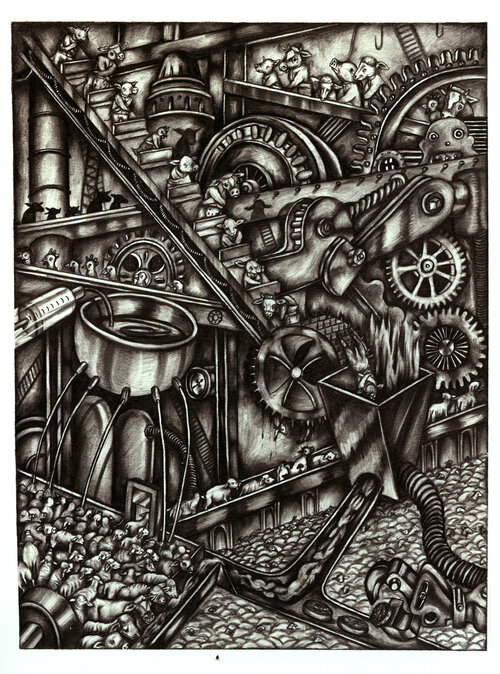The Coronavirus Crisis is a General Strike!

The coronavirus pandemic is a de facto General Strike against a political and social order that privileges the few over the many. But this has been a largely leaderless strike in which almost no one has issued demands. Now, in the midst of the pandemic, there remains an opportunity for working people and their political representatives to challenge the health and environmental policies that created the crisis, and forge a more humane and sustainable future. Read our demands below:
General Strike
The General Strike – a work stoppage by masses of people in a region or nation — is a political tactic that was frequently deployed from about the 1880s to the 1920s, and occasionally after that. Its purpose was to damage or destroy the governing, capitalist order to clear the way for a new system that valued people over profit. General Strikes occurred in Belgium at the height of anarchist agitation in the 1880s and ’90s, in Russia before the failed revolution of 1905, during the wave of communist uprisings in Europe after the First World War, and in England in 1926. There it successfully swept almost 2 million workers from their jobs, chiefly in the areas of coal production and public transport. After nine days, the strike was broken by volunteers who temporarily performed many of the jobs left vacant. Nevertheless, the action reinforced national labor solidarity and paved the way in 1929, for the first ever Labor Party victory in a general election.
There have been hundreds of general strikes since then – or attempts at them – but few have achieved the scale necessary to have their desired effect. I was in Lisbon, Portugal in November 2011 during a 24-hour general strike against a government mandated (IMF imposed) austerity plan. The spirit in the streets was intoxicating and inspiring, but the scale of participation was ultimately insufficient to bring down the governing party or change policy.
In the U.S. and much of Europe, a General Strike is now underway in response to the coronavirus. It started slowly: In early-March, factory workers at Ford and GM protested the risk of close contact with infected, fellow workers. Soon, they demanded factory closures and got them. At about the same time, faculty and teachers at thousands of schools, colleges and universities refused to continue business as usual, and employees in local, state and national government did the same. Now, many of them are working remotely. Millions of other workers however, in jobs that can’t be performed from a distance, or who lack the protection of unions, were laid off because of a collapse in consumer demand and state mandated closure of non-essential businesses. New unemployment claims totaled almost 10 million from mid-March to the beginning of April, and the total unemployment rate is approaching 20%, a level not seen since the Great Depression. It is certain to go higher.

The Impact on Capital
It is not only workers however, who are suffering from the economic impacts of the coronavirus pandemic. Capitalism itself has been dealt a hammer blow, as surely as if labor leaders had summoned a General Strike and the masses heeded the call. The stock market has lost a third of its value, erasing trillions of dollars in investor wealth, and many sectors of the U.S. economy – fuel, transportation, retail, tourism – have been brought almost to their knees. Oil prices are at their lowest level in a generation after demand fell 25% in just a few weeks. If the university where I teach (Northwestern) and others, had heeded their students’ calls for divestment from fossil fuel companies, their endowments would be significantly healthier today.
This is What Needs to Be Done
But for all its impact, this has been an essentially leaderless General Strike (Andrew Cuomo’s press conferences excepted!) in which almost no one has issued demands of any kind. Here’s a basic list of demands, ranging from easy to very challenging:
1. Combine stay-at-home orders with mandatory, universal coronavirus testing, including antibody testing, now available based upon emergency use certification. This will allow medical authorities to understand the scale of the outbreak and devise the appropriate response. Up to this point, governments and hospitals have been flying blind. Home testing must also quickly be made available.
2. Use state and federal military forces, and recruit the legion of unemployed, plus the thousands who have recovered from Covid-19 (and are thus at least temporarily immune), to provide food delivery and other care to quarantined citizens, especially the elderly.
3. Nationalize hospitals for the duration of the emergency, as has been done in Ireland and Spain. The idea that hospitals, municipalities, and state and federal authorities are bidding against each other for crucial supplies and equipment is madness. Moreover, hospitals need to coordinate care during an emergency, not compete for the highest paying patients!
4. The U.S. government should use executive or congressional authority to compel factories and other businesses – including pharmaceutical companies — to provide at cost the necessary masks, gloves, gowns, ventilators and medications. The federal government should organize research on antiviral therapies and a vaccine. This is no time for proprietary research.
5. Congress should guarantee a universal basic income for the unemployed and underemployed – perhaps $3,000 per person month — for the duration of the crisis. Medicare should also be made available for the entire population. The cost of these measures should be partly offset by higher taxes on the rich (including a wealth tax) and an excise tax on the profits of companies, such as Amazon, Netflix and Clorox, that are benefitting from the contagion. Nobody should get rich(er) from this.
6. There must be a nationwide prohibition on foreclosures and evictions for a least a year.
7. Bailouts should be limited to small businesses that provide essential services, such as groceries, laundromats, restaurants, bars and liquor stores, medical and dental offices, veterinarians etc. These should take the form of direct payments to cover salaries and rents. Workers in these businesses should be given paid furloughs, not termination notices.
What this means is there must be NO FURTHER BAILOUTS FOR BIG BUSINESSES such as automobile and airplane manufacturers, oil companies, big agriculture, banks, cruise companies and the rest, unless they commit to strict environmental and fair labor standards, including plans to achieve zero carbon emissions within a decade, pay workers a living wage, and change our system of food production from one that creates pandemics to one that suppresses them. In addition, any bailouts should provide support for the corporation alone, not its wealthy owners. What this means is that the government must receive an equity share in return for its funds. This would dilute the value of existing company shares, ensuring that losses are born by company shareholders (including senior management), not the American public. This is eminently fair – the reason shareholders receive big returns on their investment is that they are willing to risk their money. They must accept the downside as well as the upside of investment.

Animal Agriculture Creates Pandemics
The coronavirus pandemic is not an act of god or “black swan event.” It was anticipated by everybody who noticed the dozens of other epidemics and pandemics in the last two decades or so, such as SARS, H1N1, Zika, MERS, Ebola and AIDS. These communicable diseases are mostly the result of industrial agriculture, especially animal agriculture, expanding into liminal zones between town and country, or between industrial-scaled farms and rural hinterlands. In these areas, wild animals with pathogens dangerous to
humans, jump species, and through the intercession of domesticated animals, or the workers who move in these zones, enter the human microbiome. It should be emphasized that this interstitial agriculture is no longer a rare activity carried out by cowboys and rogues; it is becoming the rule, meaning that the passage of a viruses from rural hinterland to urban center can happen in a matter of just hours. The issue has been effectively addressed by Wallace, Liebman, Chaves and Wallace in a recent article published by Monthly Review. The same economic forces – megafarms and forest-destroying agricultural monocultures — that are exacerbating global warming, created this pandemic.
This time the zoonotic invader is COVID-19. Next time it could be an even more dangerous disease, such as Ebola or its equivalent! An international task force made up of scientists, anthropologists, farmers and environmental activists should convene to chart a path toward reforming global agricultural to make it safe and sustainable – that means it must be plant based, organic, local, and diversified. Wild areas should be expanded, not contracted, and big agriculture – especially animal agriculture – should be strictly regulated and heavily taxed so that its environmental costs are no longer externalized. Leave it to its own demise.
Where Are Our Leaders?
What we are witnessing today is a General Strike on a scale that anarchists and communists of past generations past could only have dreamed. Imagine Rosa Luxemburg’s glee at the opportunities presented by this calamity! (See her book The Mass Strike, 1906.) Indeed, governments around the world have been forced to pledge trillions of dollars to save their populations and economies, though mostly to protect the profits of banks and big businesses. Now is the time to organize workers, teachers, students, environmentalists and progressives of every stripe to demand that the crisis be fixed in such a way that it doesn’t happen again, and so that the biggest crisis of all – a global warming-created Hothouse Earth – doesn’t do us in once and for all. Who will step up and offer leadership? Bernie, AOC? Biden? Or, how about the thousands of internet journalists, bloggers, and other social media mavens? There is no need for them to literally hold hands in solidarity (stay six feet apart!) – only to raise their virtual voices together until they become a roar!
Newsletter Sign Up
Don’t miss any of our newsletters! Click the button to sign up!
